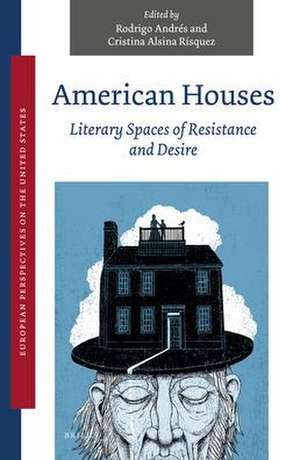American Houses: Literary Spaces of Resistance and Desire: European Perspectives on the United States, cartea 3
Rodrigo Andrés, Cristina Alsina Rísquezen Limba Engleză Hardback – 17 aug 2022
Winner of the Spanish Association for American Studies’ Javier Coy Award 2022 for best edited volume.
Contributors are: Cristina Alsina Rísquez, Rodrigo Andrés, Vicent Cucarella-Ramon, Arturo Corujo, Mar Gallego, Ian Green, Michael Jonik, Wyn Kelley, Cynthia Lytle, Carme Manuel, Paula Martín-Salván, Elena Ortells, Eva Puyuelo-Ureña, Dolores Resano, and Cynthia Stretch.
Preț: 704.36 lei
Preț vechi: 858.97 lei
-18% Nou
Puncte Express: 1057
Preț estimativ în valută:
134.82€ • 146.50$ • 113.32£
134.82€ • 146.50$ • 113.32£
Carte indisponibilă temporar
Doresc să fiu notificat când acest titlu va fi disponibil:
Se trimite...
Preluare comenzi: 021 569.72.76
Specificații
ISBN-13: 9789004520318
ISBN-10: 9004520317
Dimensiuni: 155 x 235 mm
Greutate: 0 kg
Editura: Brill
Colecția Brill
Seria European Perspectives on the United States
ISBN-10: 9004520317
Dimensiuni: 155 x 235 mm
Greutate: 0 kg
Editura: Brill
Colecția Brill
Seria European Perspectives on the United States
Notă biografică
Rodrigo Andrés, Universitat de Barcelona, is Assistant Professor of American literature and specializes in the Nineteenth Century. He is the author of Herman Melville: poder y amor entre hombres, and has published a number of journal articles and book chapters on the work of Herman Melville.
Cristina Alsina Rísquez, Universitat de Barcelona, is Assistant Professor of American Literature. She has published extensively on twentieth-century U.S. literature, and co-edited the volume Innocence and Loss: Representations of War and National Identity in the United States.
Cristina Alsina Rísquez, Universitat de Barcelona, is Assistant Professor of American Literature. She has published extensively on twentieth-century U.S. literature, and co-edited the volume Innocence and Loss: Representations of War and National Identity in the United States.
Cuprins
Notes on Contributors
1 American Houses, American Literature
Rodrigo Andrés
2 The House as Alternative to Familial Space and Time in Herman Melville’s “I and My Chimney”
Rodrigo Andrés
3 Paths Well-Trodden and “Desire Lines” in Willa Cather’s The Professor’s House
Cristina Alsina Rísquez
4 Queering the American Family Home: The Aesthetics of Place and the Ethos of Domesticity in Alison Bechdel’s Fun Home: A Family Tragicomic
Elena Ortells
5 Cape Coast Castle in the Sky: Yaa Gyasi’s Homegoing and the Im/possibility of the American Dream
Cynthia Lytle
6 The Haunted Plantation: Ghosts, Graves, and Transformation as Resistance in Charles W. Chesnutt’s The Conjure Woman
Ian Green
7 A House is a House is a House: Toni Morrison’s Politics of Domesticity, Redemption and Healing in Beloved and Home
Mar Gallego
8 The Politics of Affect with/in the African American Mansion in Stephanie Powell Watts’s No One Is Coming to Save Us
Vicent Cucarella-Ramon
9 “A Lot More Deadly”: Gender and the Black Spatial Imaginary in U.S. Prison Writings
Eva Puyuelo Ureña
10 Thoreau’s Unhoused
Michael Jonik
11 Too Tight for Comfort: Shipboard Distance as the Prerequisite for Personal Intimacy in Herman Melville’s White-Jacket
Arturo Corujo
12 “Maybe There’s Nobody to Shoot”: The Disappearing Landlord in 20th-Century U.S. Fiction
Cynthia Stretch
13 Woody Guthrie’s House of Earth: A Manifesto in Adobe as a Response to Houselessness and Domicide in Post-Depression Years
Carme Manuel
14 The Arrivant in Toni Morrison’s Paradise: Deviation, Iteration, Intersection
Paula Martín-Salván
15 “A house at odds with itself”: Barbara Kingsolver’s Unsheltered
Dolores Resano
16 Afterword: In a Fictional House
Wyn Kelley
Index
1 American Houses, American Literature
Rodrigo Andrés
PART 1: Houses: Queer Affiliations and Temporalities
2 The House as Alternative to Familial Space and Time in Herman Melville’s “I and My Chimney”
Rodrigo Andrés
3 Paths Well-Trodden and “Desire Lines” in Willa Cather’s The Professor’s House
Cristina Alsina Rísquez
4 Queering the American Family Home: The Aesthetics of Place and the Ethos of Domesticity in Alison Bechdel’s Fun Home: A Family Tragicomic
Elena Ortells
PART 2: The Legacy of the House Divided
5 Cape Coast Castle in the Sky: Yaa Gyasi’s Homegoing and the Im/possibility of the American Dream
Cynthia Lytle
6 The Haunted Plantation: Ghosts, Graves, and Transformation as Resistance in Charles W. Chesnutt’s The Conjure Woman
Ian Green
7 A House is a House is a House: Toni Morrison’s Politics of Domesticity, Redemption and Healing in Beloved and Home
Mar Gallego
8 The Politics of Affect with/in the African American Mansion in Stephanie Powell Watts’s No One Is Coming to Save Us
Vicent Cucarella-Ramon
9 “A Lot More Deadly”: Gender and the Black Spatial Imaginary in U.S. Prison Writings
Eva Puyuelo Ureña
PART 3: Troubled Boundaries of the Domestic Space
10 Thoreau’s Unhoused
Michael Jonik
11 Too Tight for Comfort: Shipboard Distance as the Prerequisite for Personal Intimacy in Herman Melville’s White-Jacket
Arturo Corujo
12 “Maybe There’s Nobody to Shoot”: The Disappearing Landlord in 20th-Century U.S. Fiction
Cynthia Stretch
13 Woody Guthrie’s House of Earth: A Manifesto in Adobe as a Response to Houselessness and Domicide in Post-Depression Years
Carme Manuel
14 The Arrivant in Toni Morrison’s Paradise: Deviation, Iteration, Intersection
Paula Martín-Salván
15 “A house at odds with itself”: Barbara Kingsolver’s Unsheltered
Dolores Resano
16 Afterword: In a Fictional House
Wyn Kelley
Index







